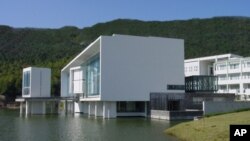Chinese architect Wang Shu has been named the recipient of the 2012 Pritzker Prize, the most prestigious award in international architecture.
His buildings include the Library of Senshing College at Suzhou University, the Ningbo Contemporary Art Museum, the Ningbo History Museum, and the Vertical Courtyard Apartments in Hangzhou.
“Oh, it’s a big surprise to me,” said Wang, the first Chinese citizen to win the award.
China’s dramatic evolution in the past two decades motivates Wang’s creations. While there has been rapid development, he says much of the collective memory of the country’s history has been lost. “I really focus on this,” he said. “Before I do a design, I think I will have some reaction to this change, to talk about its meaning to the Chinese.”
Another of Wang’s inspirations is nature. “We really want to coexist with nature,” he said. “It’s not just about how we design a building. We need a landscape, too. We design ways that architecture is mixed with nature together. You can’t separate it.”
Based in the eastern coastal city of Hangzhou, Wang is dean of the School of Architecture at the China Academy of Art. His wife, Lu Wenyu, is also an architect, and together they founded Amateur Architecture Studio in 1997.
Wang was a visiting professor at Harvard University’s Graduate School of Design last year, and the experience taught him that architecture in China and the United States has much in common.
“Some people see China and America as different,” he says. “In fact, especially in the large cities, it’s very similar to an American city. The real problem is: the challenge to Chinese architects and American architects, is keeping the traditional value of [blending] nature with urban design.”
Wang says the prize may mean an adjustment to his family plans. “For the past 10 years I do very hard work, and I feel very, very tired,” he said. “My son is three years old now, he needs me. Originally, I wanted to stop, maybe for two years, and spend more time with my son, but now suddenly I get this prize. I don’t know what it means for me, it means more buildings.”
News
Chinese Architect Wins Pritzker Prize




